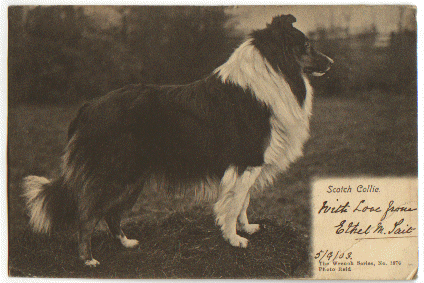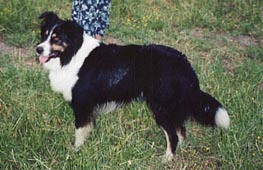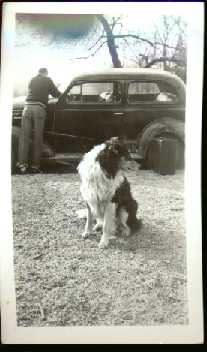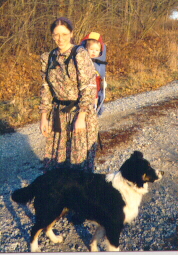 |  |
 |  |
Jacob closely resembles the old Scotch Collie pictured in this postcard that was sent in 1903. We can only be sure that the picture was taken previous to that date. Jacob's coat has continued to develop and the resemblance is now even more striking.
Here is a letter I recieved from Sandra on November 15, 1997. Jacob was five months old at this time, so the behavior is largely due to instinct.
Jacob is now fairly consistent with responding to a call back when he takes off after something. His tendency is usually to want to gather, but yesterday, Steve made pretty good progress with a situation that required driving. The cows had gotten out of their fence (a short in the electric fence made it too weak to stop them). He went to get them and of course Jacob went along. He would get the cows pointed in the right direction and start driving them back to the pasture, and Jacob would run around in front of or beside the cows and bark, driving them back the way they had come. Steve was about to lose it after the third time, but he finally managed to convince Jacob to stay beside him, and it worked very well.
This morning, the cows were out again (fence not fixed yet, although it is now!), and Steve again went out to get them. This time, when Steve told Jacob to stay with him, he was very cooperative and it went off without a hitch.
He still does not "herd" in the sense that we can ask him to bring the animals, but he will block avenues of escape when we are trying to catch an animal and he often will come into the pasture and corner an animal for us that he observes us trying to catch. He doesn't always do helpful things, but he is usually pretty easy to call off if he is just in the way. I have been surprised at his sense for how young he is.
From pages 284 through 285 in A General History of Quadrupeds, by Thomas Bewick. Printed at Newcastle upon Tyne, 1790.
This useful animal, ever faithful to his charge, reigns at the head of the flock; where it is better heard, and more attended to, than even the voice of the shepherd. Safety, order, discipline, are the fruits of his vigilance and activity.
In those large tracts of land which, in many parts of our island, are solely appropriated to the feeding of Sheep and other cattle, this sagacious animal is of the utmost importance. Immense flocks may be seen continually ranging over those extensive wilds, as far as the eye can reach, seemingly without control: Their only guide is the shepherd, attended by his faithful Dog, the constant companion of his toils: It receives his commands, and is always prompt to execute them; it is the watchful guardian of his flock, prevents them from straggling, keeps them together, and conducts them from one part of their pasture to another; it will not suffer any strangers to mix with them, but carefully keeps off every intruder. In driving a number of Sheep to any distant part, a well-trained Dog never fails to confine them to the road, watches every avenue that leads from it; where he takes his stand, threatening every delinquent: He pursues stragglers, if any should escape; and forces them into order, without doing them the least injury. If the herdsman is obliged to leave them, he depends upon his Dog to keep the flock together; and as soon as he hears the well-known signal, this faithful creature conducts them to his master, though at a considerable distance.
This breed of Dogs, at present, appears to be preserved, in the greatest purity, in the northern parts of Scotland; where its aid is highly necessary in managing the numerous herds of Sheep bred in those extensive wilds.
 | the instincts to drive and gather click on Bewick's Shepherd and Bewick's Cur |  |
Elaine,
I am so delighted with what I am seeing this week. If there was any doubt left in my mind about the fact that Jacob is truly both guard and herder, there is none left now. Last week, he was rounding up yearlings. This week he is cuddling babies, and in his glory. He has been on a perpetual high all week. Before, if there was something unusual to bark at, or hawks to chase off, he did it as if it was all part of the fun. This week, he is in dead earnest about these things. He spends his days hovering around baby goats, cleaning up after them (he's a MALE, acting like a mother dog with puppies!), sleeping with them, but never letting up on his vigilant guard. Even Lady and Jenny are suspect, although he is relaxing a little about them (Lady even slept in with the babies last night). I have never seen anything so sweet as this big, masculine-looking dog hopelessly in love with a bunch of baby goats.
Now, for the million-dollar question. What happens when this batch of babies gets big enough to herd? Will they move if they aren't afraid of him, or will he resort to feet nipping to make them? I'll let you know when I find out.
SandraSandra later wrote to say that the goats were growing up knowing to mind Jacob.
We had a few incidents with Jacob yesterday that are leaving me a bit puzzled as to how I should react and what direction the training should take. Here is what happened: Yesterday afternoon, all three dogs took off out of the yard barking. A few moments later, I heard one of our guinea keets making some loud distress noises, and I ran outside, thinking it had gotten out and maybe the dogs were hurting it. The collies were standing back watching and Jacob was actively going into the bushes after it. He was standing in one spot barking repeatedly. I looked into the bushes, and sure enough, inches from his nose was the guinea keet. He had trapped it against the fence. I retrieved it and Jacob got very excited, running circles around me and leaping around snapping at it. I corrected him and told him "GENTLE!", holding the keet up to him to sniff at it but making sure he didn't bite it. He didn't want to sniff at it and kept up the excited act until I put the guinea back in the pen. I was puzzled since Jacob is usually a very calm and gentlemanly sort of dog. Leaping around wildly is not typical at all.
Late that night, we again heard a guinea distress call. We took a flashlight and went out to investigate. Once again, the collies were watching as Jacob was going up and down the length of a dense thicket of long neglected rose bushes that was a thick tangle of intertwining thorns. I watched him for a moment and then told him to find the guinea. He searched for awhile along the edge until he was satisfied that he was close, and then started to inch his way into the middle of that horrible tangle of thorns. A minute or two later, he gave a few soft, muffled barks. I shone my flashlight into the bush where he was, and there was the keet, not three inches from his nose. I retrieved it, and once again he started the hyper act, running around and leaping into the air, snapping at it. I corrected him again, holding the keet down for him to sniff and look at, but he turned his head away (apparently the temptation to snap at it was too much!). When I threw it back in the pen, he had a very alert attitude at the side of the pen, almost like a hunting stance, as he watched the bird go back to the flock.
Here is my dilemma: Is he exhibiting hunting or herding behavior? I don't think his intention was to kill the birds, or he could easily have done so both times in the bush. Of course, even if it is herding behavior, a snap at a baby bird is not quite the same as a snap at the heels of a goat! How I correct his behavior really depends on his intention and what is motivating his behavior.
I would really appreciate any insights from those of you who are familiar with working dog behavior, especially any who have experience in using dogs with poultry.
SandraThis whole incident is really pretty funny, when I think about how worried I was about appropriate "training" for him in this situation. It's a nice development to have the dog figure the situation out for himself!
SandraJacob has decided that the birds are his responsibility now. He was with me tonight while I was working on their pen. When Lady walked up, he growled a warning at her, just like he does when he is stating his exclusive right to the baby goats. This afternoon, he helped round up the guineas and escaped chicks, hopefully for the last time! One guinea took off across the field and he went after it. I held my breath, sure that he would involuntarily kill it in trying to catch it. He gave a big lunge and caught the keet's wingtip between his teeth, and then he firmly planted his foot on it, holding it there till I came and picked it up. It was totally unhurt. I have seen Jenny do that with full-grown chickens before when we were rounding them up, but it was really interesting to see it done on a baby bird, without hurting it at all. I have a feeling we won't have too much trouble when we release our guineas, except maybe to convince Jacob that they don't belong in the pen anymore.
I still can hardly believe that Jacob is OUR dog. I have always been of the opinion that dogs like that belonged to other people.
From: Steve Niedrauer
We had a real breakthrough with Jacob today when it comes to cows. About
time, eh?
Today, my son rode his bike over to the other side of the farm where we are having some building done. The workers had dismantled part of the cattle fence and when my son rode up, the cows were all out. When they saw him, they bolted for the woods (smart cows!). Jacob, who was with him, took off after them. However, this time his running was purposeful. He bunched up a few of them and herded them back into the pasture and then went back for two more that had scattered. He got one of them and drove her back into the pasture and went back for the last one. She thought she had outsmarted him by jumping into our two-acre pond in the middle of the woods. She swam out into the middle, but Jacob didn't hesitate. He jumped into the water after her and swam around behind. It worked. He got her out of the pond and drove her back where she belonged. All this while my son sat and did nothing but look on with great interest.
I don't know if this incident will result in Jacob being cured forever of being too wild around the cows, but it sure proved that when push comes to shove, he's very capable of behaving like he should. Sandra
A few weeks ago, Jacob figured out how to move the cows on his own. Today, the cows were out because somebody knocked down the fence. The cows were scattered through the woods, so Steve and my son David took Jacob over there to try and track them down. Jenny heard the commotion and ran clear across the farm to go join them and help. Jacob understood what Steve wanted and he and Jenny put all the cows back! What a thrill. It took him till he was two years old, but he's got it. We have yet to do any real herding training. One thing and another keeps coming up to stop us before we get fairly started. It has been discouraging, but it's pretty neat to see him figuring it out in spite of us!
SandraHe had no trouble roping the calf, but he hadn't counted on Martha, the momma cow, who has HORNS. She heard the calf bawling, saw the rope, and went ballistic. She charged David, who was afraid to let go of the rope for fear the calf would take off and get hung up somewhere. He tried to get out of her way while still hanging on the the rope, but with a fighting calf on the other end he couldn't move quickly enough. At that moment, Jacob quite possibly saved his life. He darted in between David and the charging cow, and lunged at her face, snapping and snarling. Martha stopped her charge and backed off, bawling.
David grabbed up a fiberglass fencepost and tried to drive her further back so he could get close enough to the calf to get the rope off its neck. Talk about an angry momma! Jacob went after her again and kept her distracted while David tried again to get close to the calf. This went on for half an hour, until the calf gave up and lay down. By this time, Molly (one of Jacob's daughters) had heard the commotion and had run out to join Jacob, and the two of them kept Martha busy long enough for David to run up to the calf, get the rope off its neck, find out it was a bull! A happy ending to what could have been a tragic story.
I don't think David will be roping any more calves until he gets a horse! Thank the Lord for Jacob.
SandraMost people with 60 acres of sheep pasture and sheep scattered throughout would have a specialized herding dog. The fact is, most small farmers that I know don't have 60 acres of pasture with sheep scattered throughout. For those farmers, a combination dog, such as a farm collie, is ideal.
Take us, for example: we have 64 acres total. We have a goat dairy with a total of about 40-50 goats at any one time. They are in permanent paddocks and are tame from handling. We have no need for a high energy border collie--in fact, a dog like that would be a liability for us. Instead, we have farm collies. They keep the "wolves" away (stray dogs, coyote/wolf hybrids, and bobcats around here). They keep the goats in the paddocks where they belong (and the cows too!). They keep the pests away--rats, mice, squirrels, possoms, snakes, and coons; and if they won't stay away, they kill them. We've never lost a goat or a cow, even though our neighbors (who have specialized dogs) all have.
We have no need for a herding dog that could go all day. Nor for a guardian dog that never leaves the pasture (especially since we have multiple pastures). Nor for a hound who could hunt coons all day without a break. If someone needs a specialized dog, it is usually because they have a specialized interest, or a specialized farm, or a specialized need. For the rest of us, the multi purpose dog is perfect.
It isn't a matter of not spending time with the dog, either. A farm collie gets lots of your time just being with you wherever you go. However, most small farmers don't have time to dedicate to specialized training, which takes hours of doing that and nothing else. In fact, many farmers and ranchers who use specialized herding dogs don't have time to train them either--they buy them already trained. The advantage of a farm collie is that they learn just by following you around and learning to read you, learning your routines, and learning what you want and don't want. "Training" happens while you work. A dog like that is a real working partner. Not a neglected worker that does a lot of things poorly and nothing really well.
Sandra| Index Page |  | Get your Free Homepage
